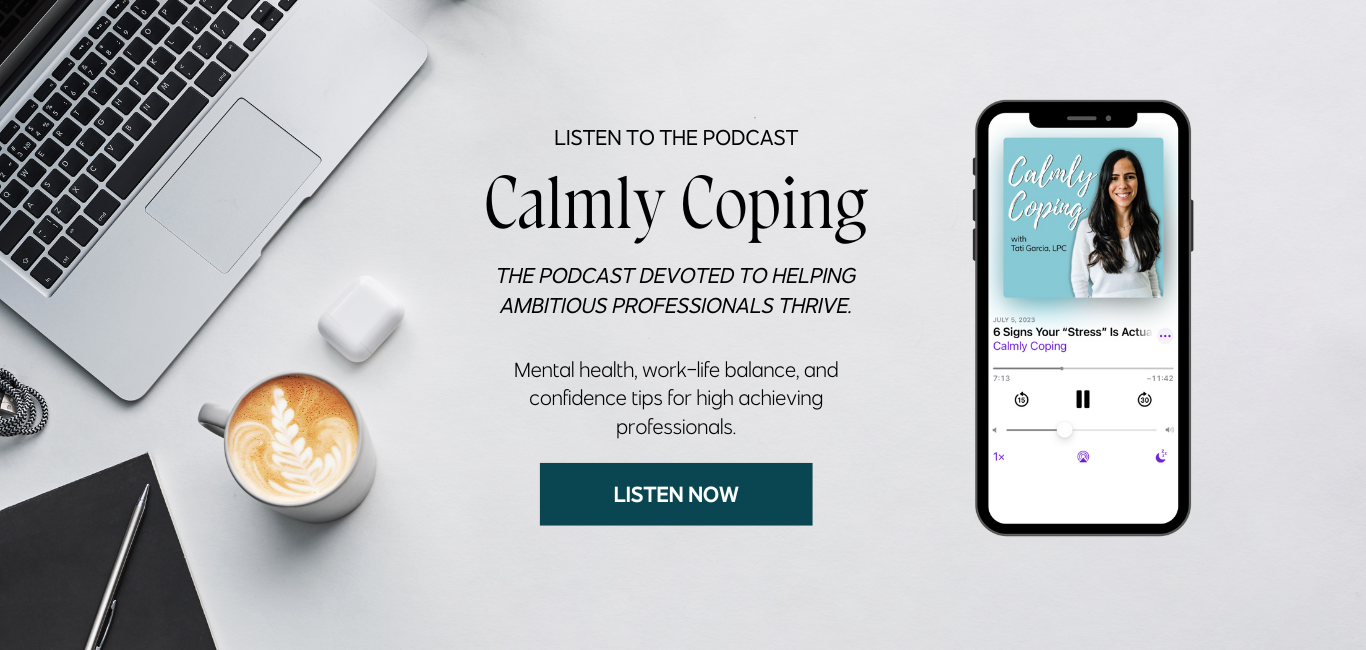Feeling like the fear of failure is constantly whispering in your ear, telling you you’re not good enough or that you’re bound to fail? This fear can lead to anxiety, procrastination, and a desire to push yourself too hard or self-sabotage when taking steps towards your goals. In today’s episode, we’re diving into this fear that holds us back, and I’m here to share some comforting words and practical steps to help you kick that fear to the curb. Let’s dive into this together and find our calm in the face of failure.
In this episode, you will learn:
- What the fear of failure is, and what drives it
- How the fear of failure impacts high-achievers
- 3 tips to help you overcome the fear of failure and build inner confidence
LISTEN NOW:
🎧 CLICK HERE TO LISTEN TO CALMLY COPING WHEREVER YOU LISTEN TO PODCASTS
WATCH NOW:
SUBMIT A MESSAGE, QUESTION, COMMENT OR SUGGESTION TO THE PODCAST: Message
FREE TRAINING: How to Create Work-Life Balance and Feel Calmer From Within
If you want to learn how to take back control of your life so you can feel calmer and more confident, and learn the tools to spend your time according to what matters most to you (no matter what your schedule is like right now)…

LISTEN, REVIEW, AND SUBSCRIBE TO THE PODCAST!

INTRO/OUTRO MUSIC: Rescue Me (Instrumental) by Aussens@iter (c) copyright 2018 Licensed under a Creative Commons Attribution (3.0) license. http://dig.ccmixter.org/files/tobias_weber/57990 Ft: Copperhead
DISCLAIMER: All content here is for informational purposes only. This content does not replace the professional judgment of your own mental health provider. Please consult a licensed mental health professional for all individual questions and issues.
Interested in diving deeper to get support for high-functioning anxiety?
I offer 1:1 coaching to help high-achievers overcoming high-functioning anxiety so they can feel calmer, more present, and have improved balance in their lives. Click here if you’re interested in learning more and getting started.
Calm, Balanced, & Confident is my comprehensive A→Z self-paced course to help high-achieving professionals overcome high-functioning anxiety so they can feel calmer, balanced, and more confident without the anxiety and overwhelm. Click here to learn more and enroll today.
Looking for ongoing support and guidance with high-functioning anxiety? The Calm & Ambitious Community is the exclusive community for high achievers with high-functioning anxiety. Click here to learn more and join us today!
TRANSCRIPT:
Click to view the episode transcript.
Are you feeling like the fear of failure is whispering in your ear telling you that you’re not good enough or that you’re bound to fail? This fear can lead to anxiety, procrastination, and a desire to push yourself too hard or self sabotage when taking steps towards your goals. In today’s episode, we’re diving into this fear that holds us back.
And I’m here to share some comforting words as well as practical steps to help you to kick the fear of failure to the curb. So let’s get started.
Welcome to Calmly Coping. My name is Tati Garcia and I’m a licensed therapist and coach specializing in high functioning anxiety. I help high achievers stop overthinking everything so they can feel more calm, balanced, and confident from within. If this topic interests you, then please like, subscribe, and hit the notification bell so you’ll be notified every time I release a new episode.
Thank you so much for tuning in. So Paolo Coehlo, an author, says that the secret of life is to fall Seven times and to get up eight times. And I think that is an excellent perspective when we are looking at the fear of failure because failure can happen, but ultimately you do not fail until you stop trying.
And even if that looks like trying in a different way or taking a step back, it is not. necessarily a failure. And so the word failure, sometimes I don’t even like to look at things in that way because not everything that goes poorly or doesn’t go according to plan is a failure. And so part of working on and overcoming the fear of failure is actually transforming your mindset when it comes to the way that you view failure.
And that’s part of what I’ll be discussing in today’s episode. First of all, what is the fear of failure? So the fear of failure is otherwise known as atychiphobia and it is a complex psychological phenomenon characterized by an intense aversion to failing or falling short of one’s standards or objectives.
And it’s not just about the tangible outcomes or outcomes. aspects of failing, but also the emotional distress that can arise when it comes to not meeting your own expectations or the expectations that you feel other people have for you. Individuals in the definition I found, it says individuals with a strong fear of failure may experience anxiety, procrastination, and a decrease in motivation when faced with challenges or new opportunities due to the worry that they will not succeed.
High achievers can be especially susceptible to the fear of failure. And, and that’s because if we look back to the definition, it can be not meeting your expectations and high achievers tend to have higher expectations. Therefore, the fact that you have a higher expectation means that you may be more likely to not.
reach those expectations, especially if they’re not always realistic, especially if you’re putting a lot of pressure on yourself, being hard on yourself and expecting yourself to do perfectly, or maybe having perfectionistic expectations, then just logically you would imagine that somebody that’s high achieving would struggle with meeting those expectations all the time versus somebody who you.
Maybe doesn’t have as high of expectations. Now that does not mean that it’s bad to have high expectations or it’s bad to be somebody who’s high achieving. It’s just about having a realistic mindset when it comes to what you’re achieving and the way that you approach failure or not achieving the things that you set for yourself.
So a study explored the connections between mindset, fear of failure and goal orientation, as well as the imposter phenomenon, otherwise known as imposter syndrome among working adults. And it found that a fixed mindset was actually significantly related to higher levels of imposter phenomenon and the fear of failure.
So a fixed mindset is when you view things as unchanging. You view either parts of yourself, your abilities, your skills, the way that you approach a situation to be something that is unchanging and viewing it as something that is fixed rather than a growth mindset is where you can see that you can learn and grow.
So it’s just what it sounds like. And so if you’re somebody who has more of a fixed mindset, then you’re more likely to struggle when it comes to the fear of failure, but also with imposter syndrome. According to this study. So I talked about some of the consequences of the fear of failure. So it could be procrastination, perfectionism, and maybe avoiding challenging opportunities.
So it could be one of two ways. You either put yourself into opportunities that are really, really challenging and then put a lot of pressure on yourself and then maybe that can result in procrastination because you have these big goals and so you keep putting it off because you’re afraid of failing and not achieving those goals.
Or you could avoid putting yourself in these kinds of situations that are all and maybe just stay in your safe zone and do the things that are comfortable for you and do the things that are familiar because you’re so afraid of trying the next step, going out of your comfort zone and then potentially failing.
And as a result, you may take that failure personally. And that’s one struggle that can happen when it comes to the fear of failure is taking failure to be personal. That is because we can view a failure. Failure as a reflection of our abilities as a person, as a reflection of the way that we are showing up or our personality or whatever it might be.
And so one tip when it comes to overcoming the fear of failure is learning to not take failure or not meeting your expectations personally. Rather seeing it as something that is just limited to this specific period of time. So you did not reach your goals now versus. There’s something inherently wrong with you and that means that you didn’t reach this goal and you’re never going to reach this goal.
You can see that that’s something that is more pervasive and more unchanging and coming from that place of being a fixed mindset as opposed to a growth mindset of, okay, I didn’t reach this goal now. How can I learn or grow from this? What can I learn in order to achieve this goal next time, or how can I use this information to maybe adjust my goals for the future?
So reframing the way that you look at failure is a massively important way to change your relationship when it comes to failure. And so now this goes hand in hand with that, but how can you view your failure as something that you can learn from? Oftentimes we see failure as something that is final and you didn’t achieve your goal and then there are these negative consequences that can occur as a result.
However, oftentimes we can really learn a lot from moments of failure. One example I recently heard in a mindfulness meditation that I was doing, it was a guided meditation, and it was on the mindfulness. com app, which I use pretty much all the time. And he was sharing how, when it comes to meditation, we can view the fact that we’re having thoughts as a failure.
We can see that, okay, I have all these thoughts coming up, I’m supposed to be clearing my mind, I’m supposed to be, supposed to be focusing when really that is a misunderstanding when it comes to meditation and to mindfulness practice. It’s really about noticing what’s coming up. It’s not about not having thoughts.
However, he used a reframe that actually when thoughts come up, that is an opportunity for you to strengthen your muscle of awareness and of focus. It’s an opportunity for you to notice I’m having a thought come up. My mind is wandering. catch yourself and then bring your attention back to whatever it is you were focusing on previously, oftentimes it is the breath.
So that’s a simple way of kind of visualizing the fact that things that we may view as a failure are not always failures and they’re actually helping us to grow and improve as people. And it’s not necessarily, it’s that cliche of it’s not necessarily about what happens to you, it’s about how you respond to what happens to you.
And that includes in moments of failure. And so if you can view failure in that way that you can learn from failure, that there are ways that you can grow from failure, then that can help you to not see failure as this giant thing that needs to be avoided, and actually help you to be more resilient and have more courage in the face of failure.
Also, when you can look at failure as something that is not this plague that needs to be avoided, but something that can actually help you to improve and grow and move forward, then you can recognize that failure is actually something that can be strived for. It’s driven for? Whatever the word is. And this might seem counterintuitive, like why would I want to fail?
Why would I want to put myself in situations where I could potentially fail? However, the more that you fail and the more that you get comfortable with failure, then it’s like facing any other fear. The more you can realize that it’s really not as bad as your mind is making it out to be. It might seem like this terrible thing that can happen, but However, you’re actually more resilient and you can handle more than you give yourself credit for.
And so doing things that are outside of your comfort zone, that are going to be a little bit anxiety or fear provoking, but ultimately help you to work towards the things that are important to you in life. will help you get out of this place of paralysis and procrastination and putting things off and help you to take steps forward towards the life that you actually desire for yourself.
And that can happen by baby steps. So it’s not necessarily about diving straight into the deep end and doing the thing that is the most difficult. And the most scary, but about gradually doing these small steps one by one. So, for example, if you’re somebody who fears failure when it comes to public speaking, which is a common one, which is something that I used to struggle with a lot and still do sometimes, then you can take these baby steps to help you to feel more comfortable.
Part of that for me was starting this podcast. And I also recently joined Toastmasters, which is a public speaking group that helps you to improve your public speaking skills. And so all of these are small baby steps that I have taken to put myself out of my comfort zone and to take steps towards doing things that are a little bit scary.
a little bit uncomfortable for me. However, the more that I’ve done them, the more I’ve built my confidence and even if things didn’t go well, even if I did podcast episodes that I wasn’t happy with, I still see those as stepping stones that helped me to get where I am now, which is vastly more confident when it comes to speaking and expressing myself.
So you can apply this to any situation where you’re fearing failure and see, is it possible to take baby steps, even if it’s outside of. what you’re currently doing. So maybe it’s practicing these skills with somebody that you trust, or maybe it is joining a group that’s going to support you in reaching the goals that you have.
Taking risk is something that is super important and necessary when it comes to working towards the things that we want. And it’s about having that balance between taking the risk Doing the thing that’s a little bit outside of your comfort zone, but also not having an intense amount of pressure that you’re putting on yourself because we don’t want to stress ourselves out even more.
So it’s about doing the thing, but not being unnecessarily hard on yourself. So that approach can look like self compassion and is something that I always often like to teach. So it’s about doing the thing, but being compassionate and supportive with yourself along the way. Studies demonstrate that people who practice and are more self compassionate are actually more resilient to failure.
And so that’s because they’re not necessarily Beating themselves up when things don’t go according to plan, but they’re able to support themselves. They’re able to be there for themselves, and they’re able to say, it didn’t go according to plan. That’s okay. What can you learn from this? How can you try again and do things differently next time?
So, to sum it up, the combination of understanding and changing your mindset. Changing from a fixed mindset to a growth mindset. Understanding the ways that you can learn and grow from failure, and how it’s necessary to help you to achieve your goals. Even taking the word failure out of your vocabulary and seeing this, how can I learn from this, rather than what went wrong here.
It’s not to say you ignore what went wrong, but you’re looking at what went wrong as something that you can learn from, rather than then as something to beat yourself up about. Next, it’s about taking risks outside of your comfort zone. So doing things that are a little bit scary, a little bit uncomfortable for you.
However, seeing these as opportunities to grow and help you to be more resilient when it comes to failure rather than continually avoiding because the things that we avoid, those fears become bigger in our mind and it feels even scarier to do in the future. And also having a self compassion approach when it comes to failure.
Being your own best friend and your own support rather than beating yourself up and recognizing that failure is not something that defines who you are as a person. It is not something that is permanent and you’re able to be kind to yourself throughout the process of doing things that are uncomfortable because regardless of who you are, how much you have accomplished, how many fears you have faced, we all have fears as humans and it’s okay to feel afraid.
And it’s okay to be kind to yourself in the process of being afraid and doing things that are a little scary. I hope these tips were helpful for you when it comes to overcoming the fear of failure. Just know that it is something that is possible and it happens through small baby steps over time.
I’m actually excited to announce that I have a new feature I’m going to be introducing in my podcast. We’ll see how this goes. I’m experimenting with a voice message feature. So what this means is this gives you an opportunity to send me a voice message. This can be a question that you have for me to address in the podcast.
It can be a comment on a recent episode that I’ve done. It could be a suggestion. It could be a clarification that you want of something that I’ve talked about. So you can go to calmlycoping.com/message. And this allows you to record a voice message for me. And you can give me your name. You can give me a pseudonym if you don’t want to give me your full name, whatever it is that you want to provide.
But it’s just about amplifying your voices and having more of your involvement with the podcast. I’m super excited to see how this goes and hope that you will submit your thoughts to the podcast because I’m really excited to hear from you and to hear what you have to say and to really address the things that are on your mind.
One thing I should have mentioned earlier in the episode, but I actually didn’t release a new episode last week because I was sick. So apologies for that. I’m getting back into things now. So. If you’re interested in hearing more about this topic, then leave me a comment below letting me know your thoughts about the fear of failure and letting me know if this is something that personally affects you and how if you’re watching on YouTube or if you’re listening to the podcast on Spotify.
And if you’re interested in getting more support and diving deeper, you can click on the work with me link below to learn more about how I can support you. If you’re somebody who struggles with anxiety, high functioning anxiety, and or the fear of failure. While you wait for next week’s episode, I have other episodes about calming your mind, increasing work life balance, and feeling more confident from within.
So thank you so much for tuning in today and until next time, be calm.


Until next time…













